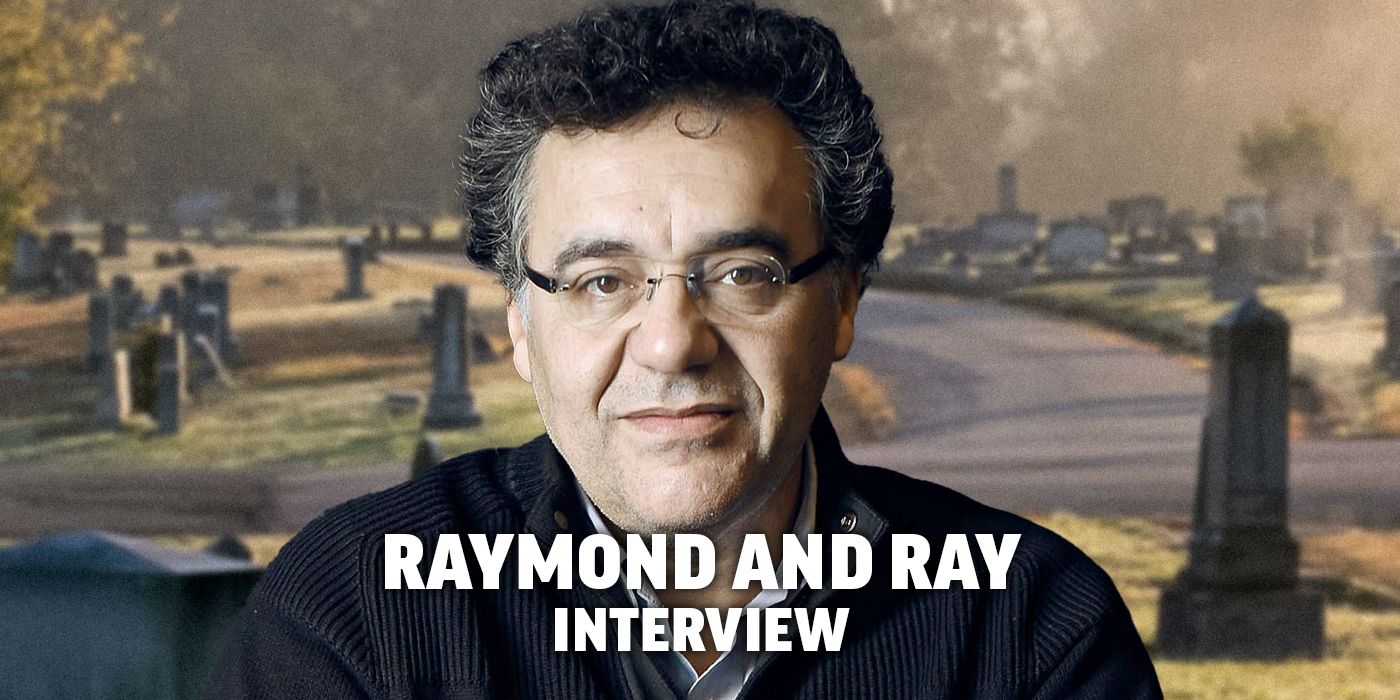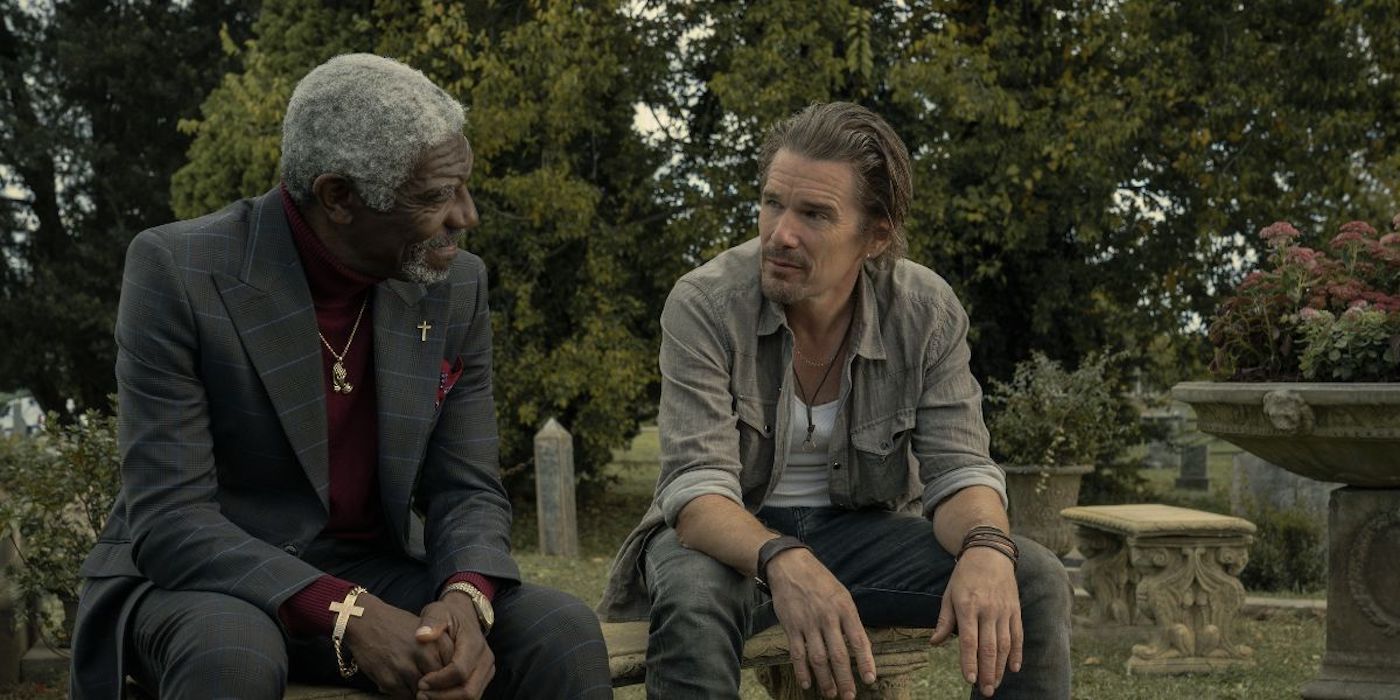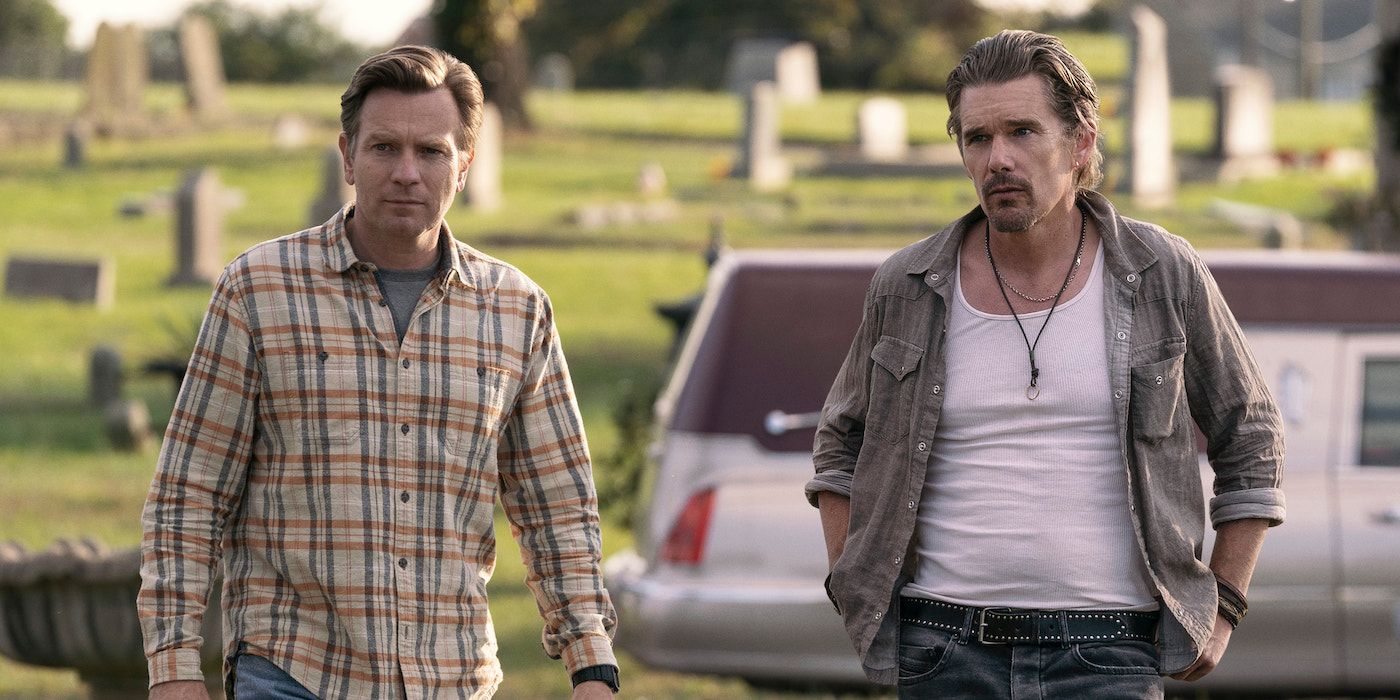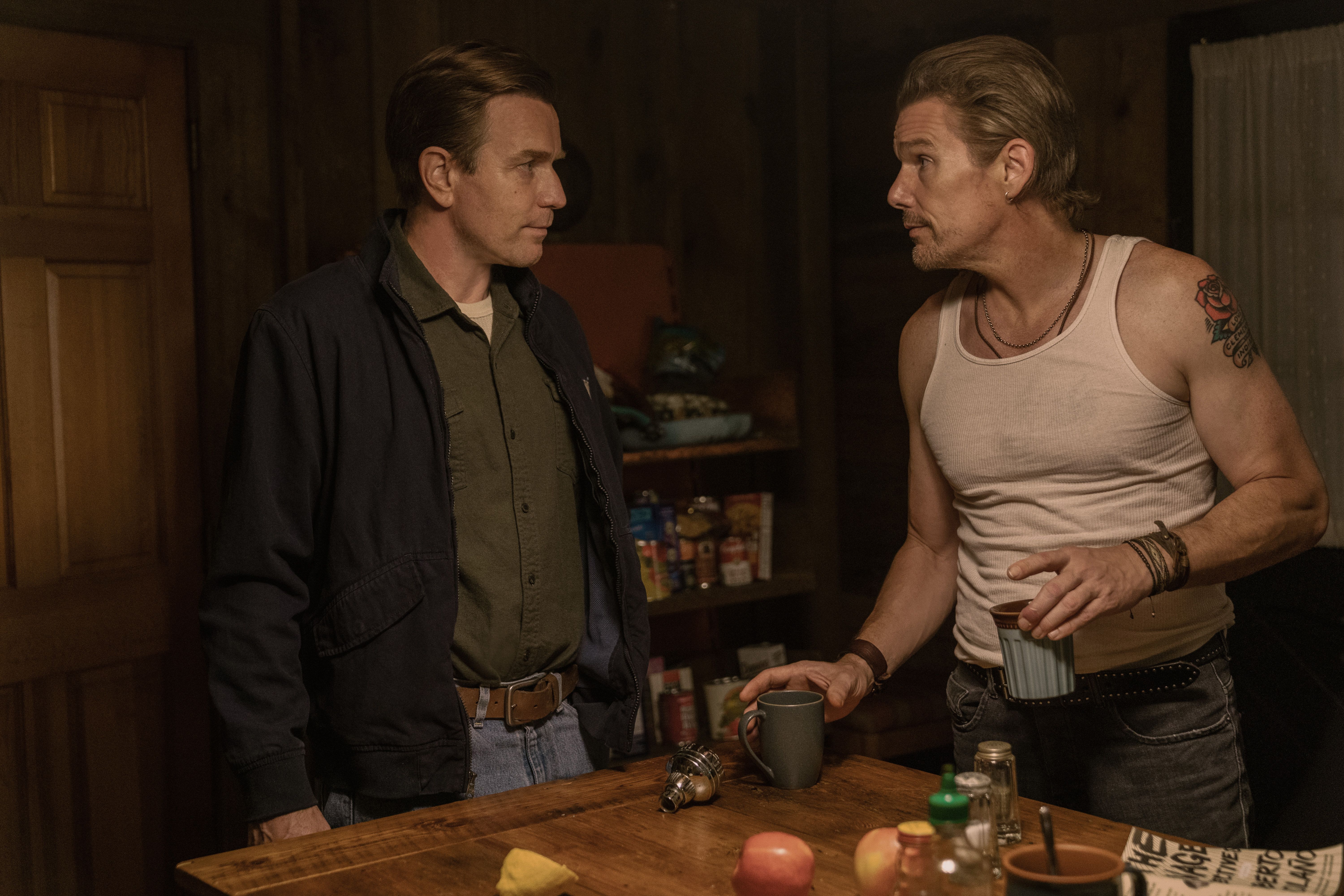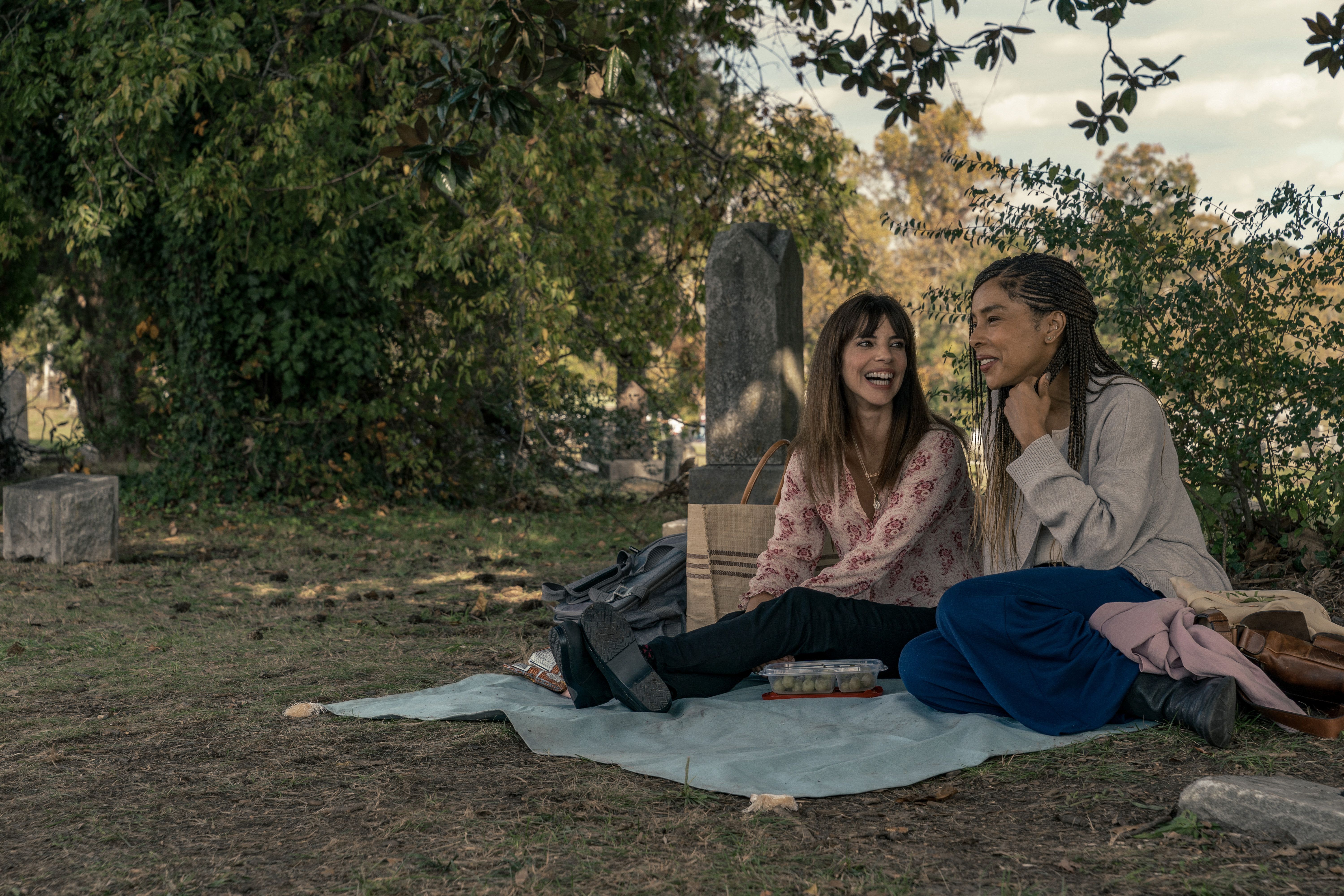With Raymond & Ray now streaming on Apple TV+, I recently spoke with writer-director Rodrigo García about making his latest film. Raymond & Ray tells the story of two half-brothers (Ethan Hawke and Ewan McGregor) who take a road trip to bury their father after he dies. Both had a bad relationship with the man, and both had reasons to hate him. But somehow, they each still have a sense of humor, and the road trip allows both of them to try and escape his ever-present looming shadow and gain closure in their lives. The film also stars Maribel Verdú, Sophie Okonedo, Tom Bower, and Vondie Curtis Hall. Raymond & Ray was produced by Alfonso Cuarón, Bonnie Curtis, and Julie Lynn.
During the interview, García talked about how projects like this are difficult to get made, casting Hawke and McGregor, the way he writes, how the film changed in the editing room, how he likes to shoot on set, why he tries to avoid certain types of scenes on the first few days of filming, and projects he’d like to make. In addition, he talks about a movie he recently wrote titled Familia, which would be about a day in the life of an extended family in Mexico.
Check out what Rodrigo García had to say below.
COLLIDER: You have a long and illustrious resume. If someone has actually never seen anything that you've done, what is the first thing you want them watching and why?
RODRIGO GARCÍA: Wow, that is hard to say. I'm always thinking backwards, meaning this is my most recent one, so it's the one, despite my mixed feelings about everything that I do, this is my beloved one this week, because it's the new baby.
Sure.
GARCÍA: But I suppose it's always better, when you're seeing someone's work, to see it in chronological order, to see how they develop.
I would imagine a lot of people want to work with you. You've obviously been able to make many projects. If you could get the financing to make anything you want, what would you make and why?
GARCÍA: I have a couple of scripts that I haven't been able to make, but I also haven't been able to cast them adequately, which I think is a problem with the script. I tend to think that the first filter of the script for me, apart from, of course, my feedback from readers or from my producers, actors and actresses, in particular, they're joining a project is them giving me their green light, their go ahead. There's a couple project I haven't able to get made because actors don't respond to them, so money wouldn't change that problem. Yes, I have a couple of ideas that, if I had more money, I would try to make with a little more time. But honestly, I am a knuckle-headed, I would just make another one of these. What can I tell you?
One of the things that I found so enjoyable about the movie is that, and I don't mean to reduce it to this terminology, but it's a talking drama and they're very hard to make nowadays. I commend Apple for making it and everything to bring this to the screen. Can you talk about how it is a genre that's it used to be the staple and now, it's really hard to make these?
GARCÍA: Well, it's what I call, it's just movie for grownups. It's R-rated not for sex or violence, but because of the situations and language and it's, I think, in my opinion, a very soft R.
I'm surprised it's R, to be honest with you.
GARCÍA: Just some cursing.
Oh, that's why.
GARCÍA: But it's not anything that would scare anyone. These are the movies where a lot of the screenwriters and directors have migrated to series and limited series, which give you a better chance to tell these grown-up stories about relationships. These movies continue to be made, but a theatrical release and the cost of releasing these movies in theaters was already compromised before the pandemic, and so now, it's got to claw its way back in. I was lucky to have these producers, Bonnie Curtis, Julie Lynn, and of course, Alfonso Cuarón, and for Apple to go for it.
They always say never to write with an actor in mind, but I would imagine, because you've worked with so many gifted actors and you have relationships, did you write this story thinking about Ewan, since you've worked with him?
GARCÍA: I don't while I'm writing, because I'm not sure who the person is yet when I'm writing. The number of actors that I take as a reference when I'm writing, if I were to look back on it or someone would, you'd laugh, because I'm considering everyone from Jack Black to Anthony Hopkins. It's like, "Who is this character?" By the time I'm done, as I understand the character, that list narrows aggressively. By the time I was done with this, I did, of course, think of Ewan. I'd worked with him and he's a great actor and a great guy and collaborator, and I thought of him as Raymond and he responded right away.
So, the two of us, together with our producers spoke about who could be Ray, and Ethan was one of the first names that came up. We all had that instinct, including Ethan after he read the script, we had that instinct that they would have that brotherly chemistry. I think they did, luckily, and it's what brought a lot of humor to the movie, the way they relate to each other. From what I saw last night and from the interviews, people find the way they respond to each other is part of the humor of the movie.
To be honest with you, it's because those two are in the movie that this was a priority film for me. They're tremendous actors.
GARCÍA: Yes. Regardless of their work, which is always great, they are those actors that have this charisma that every time you say their name, people are like, "Oh yes, I love him." They are just those two guys.
So Ewan got the script first. At any point, did he say, "I want to play Ray"? Did you ever think of reversing the casting?
GARCÍA: I liked him for Raymond. If he would've said to me, "I'd rather play Ray," then I would've gone back and read the script and considered it, obviously, but it all flowed the way I think it should have flown. But yes, if he'd said to me, "Look, I want to do this, but I want to play Ray," then I'm sure I would've had to make some adjustments, because even if you're a great actor, there is just something you project, every actor projects something different. Now, of course, we see it and it's hard to imagine anyone but him playing Raymond, and you could certainly not imagine these guys playing the other guy. So, I would have considered it, of course, but I think Raymond was always Ewan and Ewan was always Raymond.
I'm obsessed with the editing process, because ultimately, that's where it all comes together. So, what did you learn from early friends and family screenings that impacted the finished film?
GARCÍA: I find that in editing, you end up learning the same stuff over and over again. You think you're ready, you think the movie's pretty close, you still have to take 20 minutes out of it. It's very humbling. There are scenes that you couldn't possibly imagine parting with, and you do. There are scenes that are your babies and you will not part with them and you don't part with them, and then you're happy you didn't part with them. You know what I mean? You can't kill all your darlings. Cutting, especially towards the end, when you're close to final cut, to locking picture, it gets a little hairy.
You're thinking, should I keep this scene, should I not keep this scene? Is this too long? Is the movie boring? Without spoiling anything, the final explosion in the cemetery, often, I thought, have we earned this? Have the characters traveled far enough for Raymond to do what he does and for Ray to do what he does, and for Ray to say the things to Raymond that he says? So, that's a preoccupation, have we traveled enough mileage or do I need more? But then if I do more, is the movie long and boring? So, yes, to answer your question, editing can be hairy.
Do you remember, what was the last thing you cut out of the movie before you picture locked and why?
GARCÍA: I trimmed the movie a little bit. I trimmed a scene a little bit that I'm still on the fence about. I still, when I saw it last night, I was like, "Eh," but you know what? That doesn't matter, because even when I look at the movie, I don't know what was taken out. If people are responding to the movie, then they respond to the movie and that's a great relief. I can't be thinking, I should have left this, I should have taken this out. All that matters is how the movie communicates. Not all that matters, of course, there's some things in there that I could have taken out that I didn't, just because I love them. When you're editing, you drive yourself crazy with little things, but then when I'm watching a movie, I'm not thinking about the little things, I'm watching the river of the movie. The movie's a river and does it flow? Are you sailing?
Do you find, when you're making a film, that you try on the first few days to film, I don't want to say challenging scenes, but things that are not huge moments, to allow people to get comfortable with the character, or is it like, "Whatever scheduling says is what we're going to do"?
GARCÍA: I don't usually have the luxury for total control of the schedule, just because our budgets. This budget was more generous than I usually have. But there's two or three scenes that I don't want to do on the first day, because they're just maybe the emotionally climactic scenes of the movie. But short of three, four scenes that I say to the AD, "I can't start with this," the rest, any will do. I actually enjoy shooting out of order. I like seeing the scenes as blocks. I know some directors, who can afford the luxury, tend to shoot a little bit more in order, not many, but some do. I enjoy shooting the building blocks separately.
I'm always curious about coverage as a director. Some people I speak with, they're very laser-focused on one camera, we have one camera today, and they don't want to do a lot of coverage. And then I've spoken to Ridley Scott and he talks about having six cameras at all times, and that's the way he likes to work. For you, when you're filming a scene where you have two great actors performing, are you thinking about, I want to shoot this with two, three cameras, or how does that work?
GARCÍA: If it can be done, that means if the lighting works, if the DP feels it can be done, I'd like to work with two cameras. Three cameras, I find a little bit more distracting and it's harder to concentrate. I've done it, obviously, when you do action scenes, or we had three cameras in those big showdowns, meltdowns at the end at the cemetery. I like to use two cameras, if both angles can be good and they can be well-lit. If not, I'll go with one.
My last thing for you, do you know what you're going to do next?
GARCÍA: I hope to do a movie in Mexico that I wrote, just a one day, a family get together in Mexico.
Does it have a title?
GARCÍA: Familia.
I won't pressure you anymore on that.
GARCÍA: There's no plot things to give up, it really is just a day in the life of an extended family and where they are that day, what is important that day, what the crises are that day.
Do you have casting yet?
GARCÍA: I'm talking to a couple actors in Mexico, but this is two weeks old.
I understand. I will leave it there and just say congratulations.
GARCÍA: Thank you very much.
Raymond & Ray is now streaming on Apple TV+

